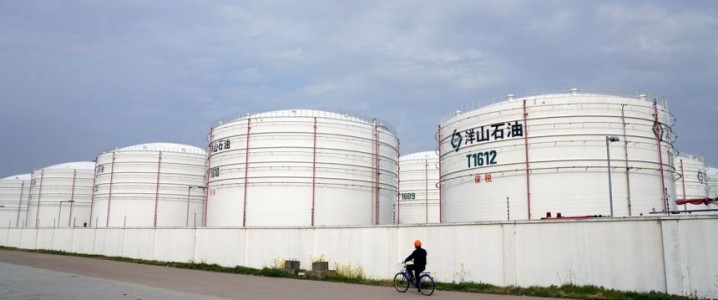Business
U.S. Intensifies Sanctions on China to Curb Iran’s Oil Exports

The United States is enhancing its sanctions targeting China, aiming to disrupt Iran’s oil exports and limit the funding of the Islamic Revolutionary Guard Corps (IRGC), a significant force behind Iran’s nuclear ambitions. This strategic move reflects a broader objective to ensure that Iran possesses no enriched material that could potentially be used in nuclear weapons development.
U.S. officials have identified China as a crucial player in Iran’s oil market, given its status as the largest importer of Iranian oil. A senior legal source familiar with the U.S. sanctions strategy stated, “We want to put Beijing back in its box when it comes to Iran and the Middle East.” This comment underscores the intention to limit Iran’s financial networks and diminish its influence, particularly by targeting its key oil exports.
China’s increasing oil imports from Iran have been evident since the U.S. exited the Joint Comprehensive Plan of Action (JCPOA) in 2018, aiming to reduce Iranian oil shipments to zero. Despite these efforts, China has consistently ramped up its imports, reportedly bringing in nearly 1 million barrels per day in recent months, benefiting from discounted prices on Iranian crude.
U.S. sanctions have historically faced challenges in curbing these imports. For instance, when the U.S. refused to extend a waiver allowing China to import Iranian oil in May 2019, Beijing continued to increase its purchases. Data from China’s General Administration of Customs indicated imports of 926,119 barrels per day in July 2019 alone, a figure that was likely understated due to unrecorded shipments.
The U.S. has since recognized the complexities of enforcing sanctions against China, particularly given the country’s ability to navigate around them. Chinese firms have shown a tendency to establish special purpose vehicles to facilitate transactions, minimizing their exposure to U.S. financial systems. The Bank of Kunlun, a prominent player in this network, has been used for transactions in euros and Chinese renminbi, further shielding these operations from U.S. oversight.
In recent months, the Biden administration has shifted its strategy to impose more comprehensive sanctions not only on Iran but also on its regional allies, such as Iraq. A notable legislative effort is the proposed “No Iranian Energy Act,” which aims to sanction Iranian natural gas imports to Iraq, a country heavily reliant on Iranian energy for its domestic power supply.
U.S. sanctions have also targeted a broader range of entities involved in supporting Iran’s military and financial networks. In December 2023, the Department of Treasury imposed sanctions on 20 individuals and entities linked to Iran’s Ministry of Defense. Under Secretary of the Treasury for Terrorism and Financial Intelligence, Brian E. Nelson, emphasized that the U.S. remains committed to disrupting funding sources for the Iranian military.
In a recent escalation of sanctions, the U.S. State Department added Zhoushan Jinrun Petroleum Transfer Co. to its sanctions list for engaging in transactions related to Iranian oil. This marks the fourth Chinese port to face U.S. sanctions in recent weeks, following actions against other terminals earlier in the year. The State Department reiterated its stance, stating, “The Iranian regime continues to fuel conflict in the Middle East to fund its destabilizing activities.”
As the U.S. ramps up its pressure on China and Iran, officials suggest that further sanctions are forthcoming. The evolving dynamics of international relations, particularly with respect to Iran and its allies, will likely influence the effectiveness of these sanctions in the months ahead. This ongoing confrontation between the U.S. and China serves as a critical focal point in the broader geopolitical landscape, with significant implications for energy markets and global diplomacy.
-

 Politics4 weeks ago
Politics4 weeks agoSecwepemc First Nation Seeks Aboriginal Title Over Kamloops Area
-

 World5 months ago
World5 months agoScientists Unearth Ancient Antarctic Ice to Unlock Climate Secrets
-

 Entertainment5 months ago
Entertainment5 months agoTrump and McCormick to Announce $70 Billion Energy Investments
-

 Science5 months ago
Science5 months agoFour Astronauts Return to Earth After International Space Station Mission
-

 Lifestyle5 months ago
Lifestyle5 months agoTransLink Launches Food Truck Program to Boost Revenue in Vancouver
-

 Technology3 months ago
Technology3 months agoApple Notes Enhances Functionality with Markdown Support in macOS 26
-

 Lifestyle3 months ago
Lifestyle3 months agoManitoba’s Burger Champion Shines Again Amid Dining Innovations
-

 Top Stories2 months ago
Top Stories2 months agoUrgent Update: Fatal Crash on Highway 99 Claims Life of Pitt Meadows Man
-

 Politics4 months ago
Politics4 months agoUkrainian Tennis Star Elina Svitolina Faces Death Threats Online
-

 Sports5 months ago
Sports5 months agoSearch Underway for Missing Hunter Amid Hokkaido Bear Emergency
-

 Politics5 months ago
Politics5 months agoCarney Engages First Nations Leaders at Development Law Summit
-

 Technology5 months ago
Technology5 months agoFrosthaven Launches Early Access on July 31, 2025





















